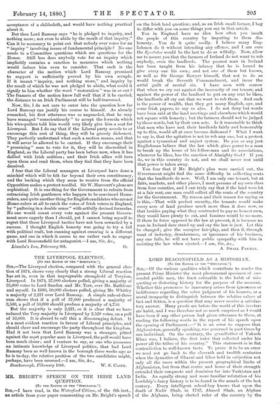LORD BEACONSFIELD AS A HISTORIAN.
[To THE EDITOR OF THE " SPECTATOR."] SI11,-Of the various qualities which contribute to render the present Prime Minister the most phenomenal specimen of suc- cessful public men, the least estimable is the habit of Mis- quoting or distorting history for the purpose of the moment. Whether this proneness to inaccuracy arises from ignorance or indifference regarding the sober judgment of his hearers, or a moral incapacity to distinguish between the relative values of fact and fiction, is a question that may never receive a satisfac- tory answer. Many proofs are before the world of this inveter- ate habit, and I was therefore not so much surprised as I would have been if any other person had given utterance to them, at reading the following words in the report of his speech upon the opening of Parliament :—" It is an error to suppose that Afghanistan, generally speaking, was governed in past times by one individual. On the contrary, the grandfather of Yakoob Khan was, I believe, the first ruler that collected under his power all the tribes of his country." This statement is in flat contradiction to well-known facts. To prove it to be an error we need not go back to the eleventh and twelfth centuries when the dynasties of Ghazni and Ghor held in subjection not only all the races within the present geographical limits of Afghanistan, but from that centre and home of their strength extended their conquests and dominion far into Turkistan and India. An equally strong and more familiar refutation of his Lordship's fancy history is to he found in the annals of the last century. Every intelligent school-boy knows that upon the death of Nadir Shah, in 1747, Ahmed Shah, an Afghan of the Afghans, being elected ruler of the country by the tribal chiefs, soon reduced to subjection not only "all the tribes of his country," but imposed his yoke upon the circum- jacent regions in every direction ; and that from Candahar, his capital, he reigned as sovereign, not merely over Cahill, Balkh, and Herat, but also over the plains of the Punjab, the moun- tains of Kashmir, and the eastern parts of Khorasan. This extensive empire remained intact during his reign of twenty-six years. Even the feeble voluptuary Timour, his son and suc- cessor, contrived to hold together during twenty years the kingdom of Afghanistan and the outlying provinces we have men- tioned. He it was who transferred the seat of government to the city of Cabul, which had been comparatively neglected since the days of Bober and his immediate successors, and from this place issued his mandates to Lahore and Serinaghur in the east, to the very gates of Meshad in the west. It was only after the decease of Timour that, owing to feuds and jealousies breaking out among the numerous members of the Suddozye family, the Afghan State fell into a condition of chronic civil war and dis- memberment, and continued so till it was again consolidated and reduced to comparative order by the strong hands of Dost Mahommed, though within much narrower limits than the original Durani monarchy. It was not indeed till the last hour of his reign (1863) that he obtained possession of Herat and the adjacent territory. We thus see " that Yakoob Khan's grand- father," Dost Mahommed, was not by any means "the first ruler that collected under his power all the tribes of his country," and that it is not altogether " an error to suppose that Afghani- stan was governed in past times by one individual." On the contrary, it was governed in succession by two of the Suddozye Amirs for nearly fifty years, a much longer period than has fallen to the lot of Dost Mahommed and his family. But such is the style of historical illustration Lord Beaconfield considers good enough for the House of Peers, and which he has the pertness to advance in support of some fanciful scheme for dividing the country among a number of greedy and turbulent Sirdars. A hopeful plan—who can doubt it ?—for making the people "prosperous, happy, and contented neighbours !"—I am,



































 Previous page
Previous page